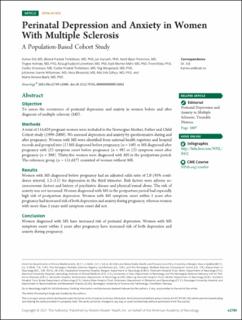| dc.contributor.author | Eid, Karine | |
| dc.contributor.author | Torkildsen, Øivind Fredvik Grytten | |
| dc.contributor.author | Aarseth, Jan Harald | |
| dc.contributor.author | Flemmen, Heidi Øyen | |
| dc.contributor.author | Holmøy, Trygve | |
| dc.contributor.author | Lorentzen, Åslaug Rudjord | |
| dc.contributor.author | Myhr, Kjell-Morten | |
| dc.contributor.author | Riise, Trond | |
| dc.contributor.author | Simonsen, Cecilia Smith | |
| dc.contributor.author | Torkildsen, Cecilie Fredvik | |
| dc.contributor.author | Wergeland, Stig | |
| dc.contributor.author | Willumsen, Johannes Sverre | |
| dc.contributor.author | Øksendal, Nina | |
| dc.contributor.author | Gilhus, Nils Erik | |
| dc.contributor.author | Bjørk, Marte-Helene | |
| dc.date.accessioned | 2021-08-12T06:57:48Z | |
| dc.date.available | 2021-08-12T06:57:48Z | |
| dc.date.created | 2021-04-23T09:02:14Z | |
| dc.date.issued | 2021 | |
| dc.identifier.issn | 0028-3878 | |
| dc.identifier.uri | https://hdl.handle.net/11250/2767439 | |
| dc.description.abstract | Objective: To assess the occurrence of perinatal depression and anxiety in women before and after diagnosis of multiple sclerosis (MS). Methods: 114,629 pregnant women were included in the Norwegian Mother, Father and Child Cohort study 1999-2008. We assessed depression and anxiety by questionnaires during and after pregnancy. Women with MS were identified from national health registries and hospital records and grouped into 1) MS diagnosed before pregnancy (n = 140), MS diagnosed after pregnancy with 2) symptom onset before pregnancy (n = 98) and 3) symptom onset after pregnancy (n = 308). Thirty-five women were diagnosed with MS in the postpartum period. The reference group (n = 111,627) consisted of women without MS. Results: Women with MS diagnosed before pregnancy had an adjusted odds ratio of 2.0 (95% confidence interval 1.2-3.1) for depression in the third trimester. Risk factors were adverse socioeconomic factors, history of psychiatric disease and physical/sexual abuse. The risk of anxiety was not increased. Women diagnosed with MS in the postpartum period had especially high risk of postpartum depression. Women with MS symptom onset within 5 years after pregnancy had increased risk of both depression and anxiety during pregnancy, whereas women with more than 5 years until symptom onset did not. Conclusion: Women diagnosed with MS have increased risk of perinatal depression. Women with MS symptom onset within 5 years after pregnancy have increased risk of both depression and anxiety during pregnancy. | en_US |
| dc.language.iso | eng | en_US |
| dc.publisher | Lippincott, Williams & Wilkins | en_US |
| dc.rights | Attribution-NonCommercial-NoDerivatives 4.0 Internasjonal | * |
| dc.rights.uri | http://creativecommons.org/licenses/by-nc-nd/4.0/deed.no | * |
| dc.title | Perinatal Depression and Anxiety in Women with Multiple Sclerosis: A Population-Based Cohort Study | en_US |
| dc.type | Journal article | en_US |
| dc.type | Peer reviewed | en_US |
| dc.description.version | publishedVersion | en_US |
| dc.rights.holder | Copyright 2021 The Author(s) | en_US |
| cristin.ispublished | true | |
| cristin.fulltext | original | |
| cristin.qualitycode | 2 | |
| dc.identifier.doi | 10.1212/WNL.0000000000012062 | |
| dc.identifier.cristin | 1905953 | |
| dc.source.journal | Neurology | en_US |
| dc.source.pagenumber | e2789-e2800 | en_US |
| dc.identifier.citation | Neurology. 2021, 96 (23), e2789-e2800. | en_US |
| dc.source.volume | 96 | en_US |
| dc.source.issue | 23 | en_US |

